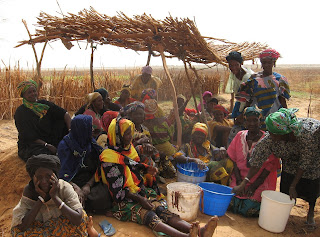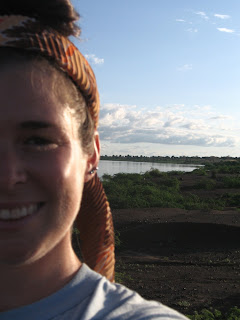
It is the quintessential photo of a Peace Corps volunteer, holding a bucket of water on her head as she is dressed in clothing similar to the natives. My experience is no different as I make the trek once or more daily and share in this Peace Corps rite of passage. A quarter of a mile away, the round trip walk can take anywhere from 20 to 45 minutes depending on who I run into on the way or at the well. Occassional sand and tree dirt makes its way into the water, but for the most part it's clear and clean enough to swim in. On days when the heat is unbearable, I've daydreamed of rappelling the 30 feet for a cool dip!
Slowly I've worked my way up to carrying a full 20 liter bucket on my head. Unlike the women and girls who have been carrying water everyday for their whole lives, I have to employ the use of al least one hand to keep the bucket steady. Over long distances, it truly is easier to balance heavy materials on one's head and I am amazed at the ease with which the Nigerien's do it. Sometimes they use a padding of cloth between their head and the bucket, but oftentimes they won't. I've seen women make quick 180 degree turns without spilling a drop, and trot past me at a speed short of a jog. All the while holding their water pulling bag in one hand with a baby tied onto their backs. The chore for me definitely does not come with such ease, but I've learned to navigate sharing the path with a herd of a hundred horned cattle, stopping to have conversations along the way and reluctantly offering a hand to the dirty children who come running up to greet me.
The main paved road runs between my hut and the well, so I frequently receive cheers and jeers from people in the cabs of passing semi-trucks, passengers of bush taxis and the occassional driver who pulls on to the shoulder to share a laugh with the "anasara" (white person) carrying water on her head. The regional finance minister even turned his Mercedes aroudn to find out where I was carrying my water to.
As with all chores, though, sometimes you just don't want to do it. Of course at these times when I'm forced to go because my water filter is empty or the gunk at the bottom of my water pot is dirtier than the arms I want to wash, the elements of frustration seem elevated. I'll arrive at the well to find a gaggle of three young teenage girls who will each in turn grab at my bracelets or earrings, reach to take my water pulling bag for themselves, or try to rewrap my sarong, telling me I've done it wrong. All the while shouting in my face, thinking the louder they are the better I'll understand them. If it were a movie, they'd have their own creepy theme song everytime they entered the scene! Cursing them out calmly with my favorite English swear words makes it a little more enjoyable.
The strong harmattan winds have also tested my patience by blowing my cloth padding both into the well and into the black mucky water around the well before I could get the heavy bucket securely rested on my head. Whatever the direction the winds seem to be coming from, they always manage to blow my sarong open, leaving me to alternate balancing the bucket with one hand while keeping my knees from showing with the other. Just when you think your patience has depleted, you take a deep breath and dig deeper for more!
On the days when the peak temperature hits 120, I can return home to dip my sarong in the cool water, wrap it around my body and take a nice long nap in the shade. The steady breeze kisses my shoulders and the clear blue sky disappears under my eyelids, leaving me to dream that instead of being in one of Africa's sandboxes, I'm somewhere in the Caribbean, soon to wake to a cabana bar and cool turquoise sea. Who says you can't live off daydreams?!!

























